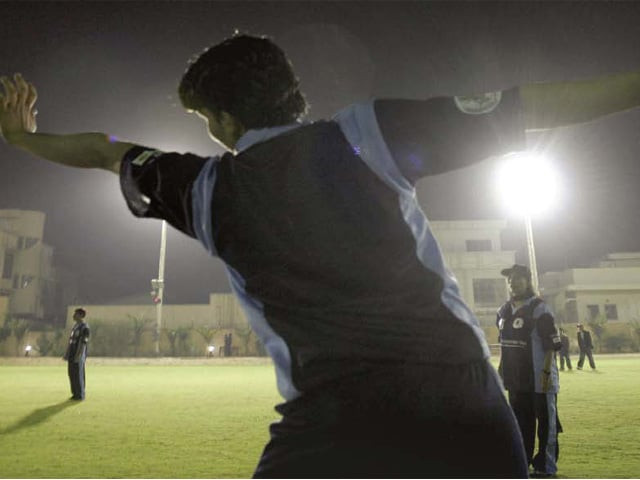HIV+ve team plays cricket match to fight negative perceptions
The event aimed at establishing a stronger social bond between those who live with HIV and those who do not have it.

Organised by the Sindh Aids Control Programme in collaboration with NGOs such as Pakistan Society, Al-Nijat, Gender Interactive Alliance and Sand, the cricket match received the support of celebrities such as Afzal Khan, Saud and Faisal Qureshi who wanted to help promote awareness about HIV.
The event aimed at establishing a stronger social bond between those who live with HIV and those who can only imagine what it means to have the condition. However, as team “Positive” — of those with HIV — stepped onto the field to play a match against team “Showbiz” led by Qureshi, the former also wished to prove that they were as capable of living life just like any other person with any other condition. Although team “Positive” lost by 20 runs, there wasn’t a winner or a loser that night as the HIV+ men and women left the field strengthened by a sense of competitiveness and acceptance.
The idea of forming a cricket team for HIV+ people originated during Pakistan Society president Dr Saleem Azam’s efforts to bring a positive change in their lives. “We work with people who have been diagnosed with the virus and we rehabilitate them from depression and bring them towards life,” Azam told The Express Tribune. “Being HIV positive means that they need to start looking at life in a positive manner, since most of these patients contracted the virus through injections or unsafe sex.”
Pakistan Society has around 1,000 registered people with AIDS, said Azam, adding, “They came to us with little self esteem and were on the verge of committing suicide as their families had disowned them and nobody would hire them.” One day, he was talking to a patient, Latif, and asked him what made him happy. When he answered “cricket” there was no going back.
Twenty-five-year-old Asif Atta, the captain of team “Positive”, said that ever since he was diagnosed with the virus four years ago, he has been trying to make every day count. With sports in his life, Atta said he feels that the opportunity to travel to other cities and meet new people has given him hope.
Atta, who contracted the disease as a drug user, feels that by being able to play with the team in different cities, he can reach out to a large number of people and help them realise that “HIV does not mean death”. In fact, it is a story of broken relationships and one should hate the disease instead of hating the patient.
Atta’s teammates — Muhammad Iqbal and Rubina Iqbal — were also very excited about the impact of their marriage as an HIV-positive couple. Although they work with the Pakistan Society in high-risk areas, including fishing communities and with industrial labourers, they continue to face ostracism — even from their own landlady. “Our landlady gets calls from people, saying that she should throw us out because we have AIDS. But now we have explained it to her that AIDS is more or less like diabetes. We just have to take our medication regularly,” said Iqbal, who has been living with the virus for nine years and was diagnosed seven years ago.
However, battling the virus is not as easy as Iqbal makes it appear. The HIV-positive community, along with the NGOs working for patients in Sindh, have a reason to worry as the World Bank recently decided to temporarily pull back its monetary support for the programme and divert its resources towards the flood survivors.
They have been doing without funds for six months. And while the medicines are provided by the government free of charge, the community is still struggling. “If we can organise sports events like this and unite the HIV community in Pakistan, I don’t think that we will need to rely too much on foreign aid,” said Azam. “If society starts [supporting] HIV patients, NGOs such as Pakistan Society no longer need to worry.”
Published in The Express Tribune, December 5th, 2010.


















COMMENTS
Comments are moderated and generally will be posted if they are on-topic and not abusive.
For more information, please see our Comments FAQ